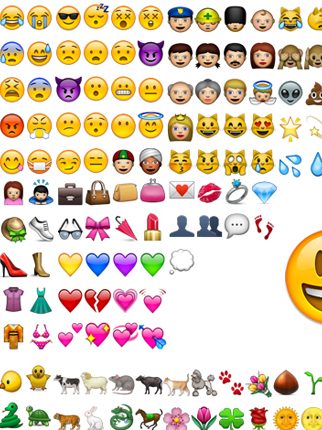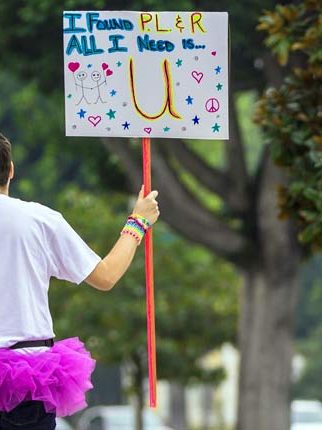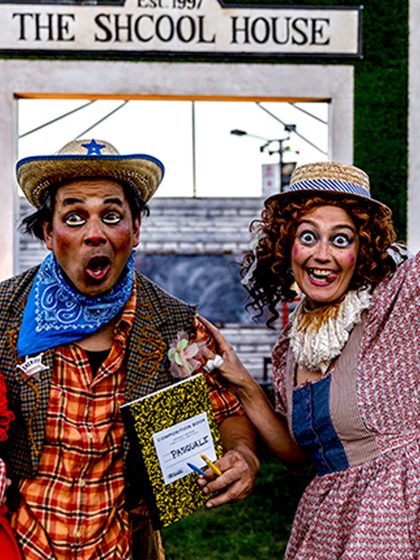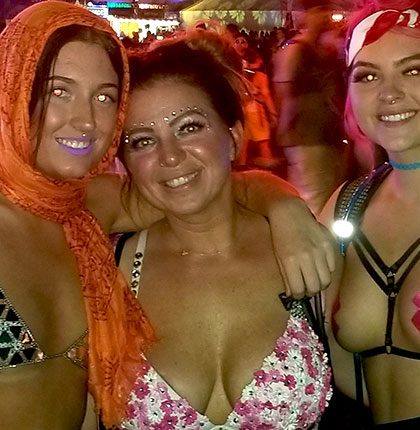The Science of Falling in Love at Festivals
When I was younger, my mother had a severe aversion to my going to festivals. “Don’t go!” she’d cry. “You’ll get hurt! You can’t trust anyone there!”
In later years, I often found myself wondering about her choice of words. Why did she always use the word “hurt?” What about a giant field of semi-naked hippies singing together in unison made her worry about me so much?
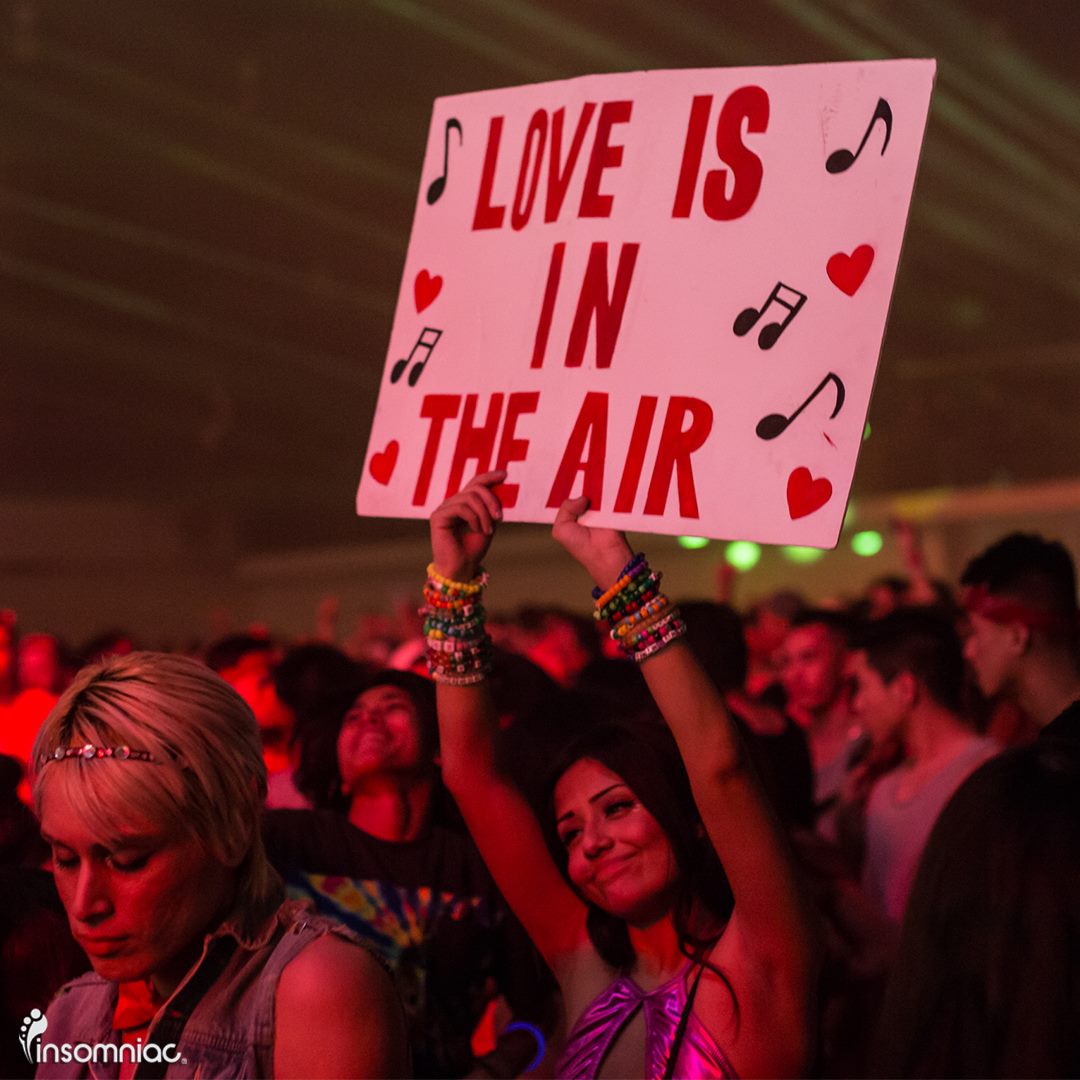
It seems absurd to think about—after all, music festivals, especially electronic ones, were famous for harboring the nicest, friendliest people in the world. Why on earth would I be scared to go to such a place by myself?
Ironically enough, I did go to my first festival very much alone. My boyfriend couldn’t get the day off work, which normally would have made me stay at home. But this time, there was something else. I was craving adventure. The lineup was just too good. I’d kick myself for missing it forever, I was certain of it. Alternatively, I didn’t know a thing about going to festivals to save my life—what to bring, how to map out your time so you aren’t curled up and unconscious on the grass six hours in, or, mostly, whom to go with to help keep you safe.
Even though I had made up my mind to go alone, I was still scared. Being scared meant not knowing what would come next; meant feeling foolish when I knew I’d be dancing alone; meant not having someone to wrap their arms around me at the end of the night.
Looking back on this memory got me thinking. Was it actually the people, not the music that, that made up a true festival experience? Was I really looking to lose myself in the arms of another—to feel wanted, accepted, loved, like I really belonged? Were these the elements that truly made festivals magical?
They were to me. The desire to fall in love at a music festival, whether it was platonic or romantic love, was the motivation that kept me going despite my fear. I wanted to meet new people, bond with them. Make new friends, hug them excessively, kiss them on the cheek, and dance with them. These were all things I yearned for but never felt I could participate in outside of festivals. After all, that would be crazy… right?
What is it about a music festival that primes the body for feelings of love?
It all goes back to evolutionary biology.
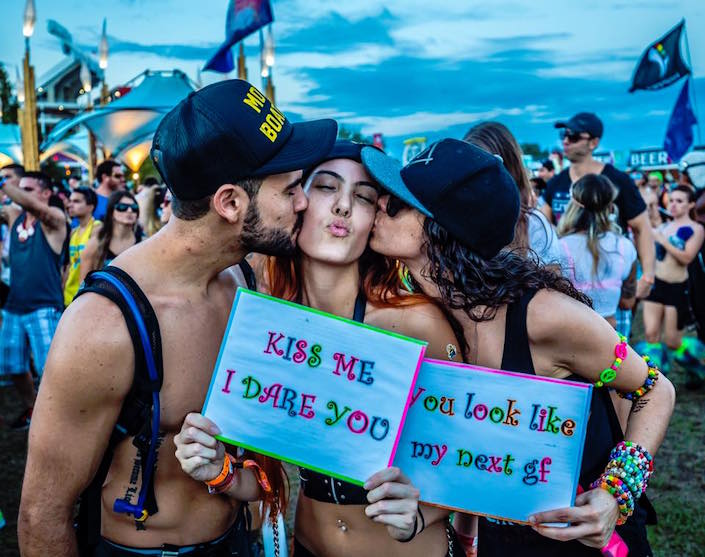
Festivals aren’t ordinary places. They’re built to be extraordinary—to look like beautiful, faraway places that are larger than life (thank you, Pasquale). It’s a surreal world where everything is new and catches your eye. From fire-breathers to dancers, fireworks and beyond, there’s never a dull moment. For most people, especially first-timers, it’s a totally new experience.
Your body experiences this whole-new-world emotion as a rush of adrenaline, the hormone your body creates in response to your primal “fight or flight” stress response. This feeling of adrenaline can easily be confused for a romantic rush or thrill, as psychologist Dr. Diana Kirschner notes for TIME magazine:The “high-octane” element Dr. Kirschner is referring to here is that thrilling sensation you feel when you try something new and extraordinary—and becomes even more interesting when you poke around Coachella’s Missed Connections site (did you know such a thing existed?). Many of the messages on there thank a mysterious stranger for coming to their aid and “saving” them, or helping them with a difficult situation:“Doing very, very high-octane kinds of dates definitely can bond you together more than a mundane, run-of-the-mill one… What happens is that adrenaline is released that mimics the feelings of falling [in] love.”
“You offered to shield us from the passing crowd. I poked you when we left and smiled. I caught you on some video we took, you were wearing a Herschel backpack.”
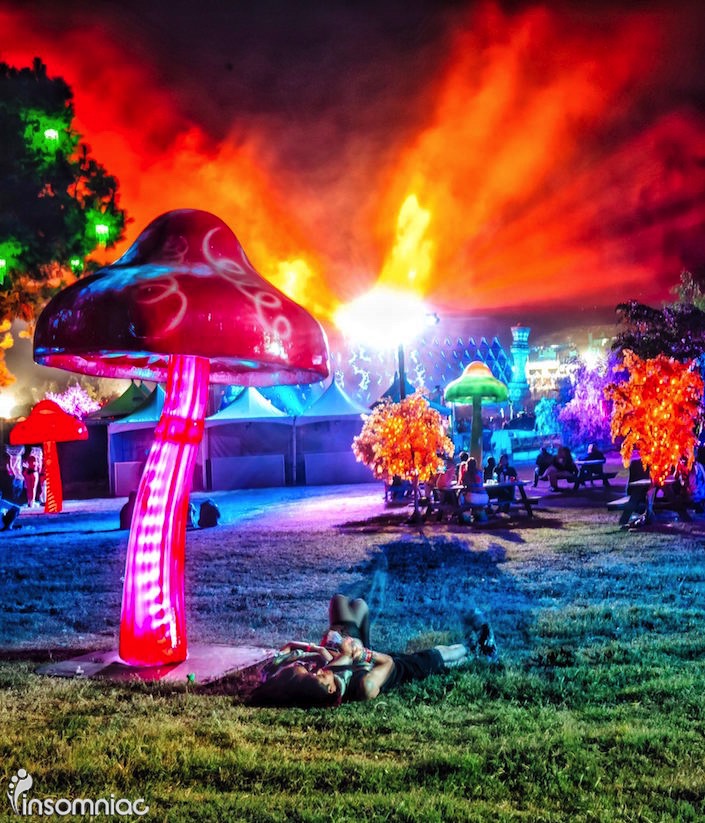
Whether it’s saving someone from an overwhelming crowd or just from loneliness, the end result is the same. Staring into the eyes of someone that was a perceived savior causes a release of the bonding hormone oxytocin, creating the sense of a deep connection between the two:
“If a person is frightened and literally clinging to a protector, a knight, they actually have the experience of being saved by this person,” Kirschner says. “Certainly it’s not going to make for lasting love, which is a whole other ball of wax, but at that moment you are bonded together and will associate a scary-turned-pleasurable high and relief and excitement with the other person.”
After the dangerous event has passed, both people will then experience another onset of hormones—this time, a rush of dopamine, the feel-good hormone. Does this mean that so many connections perceived as “love” at festivals are nothing more than a surge of hormones?
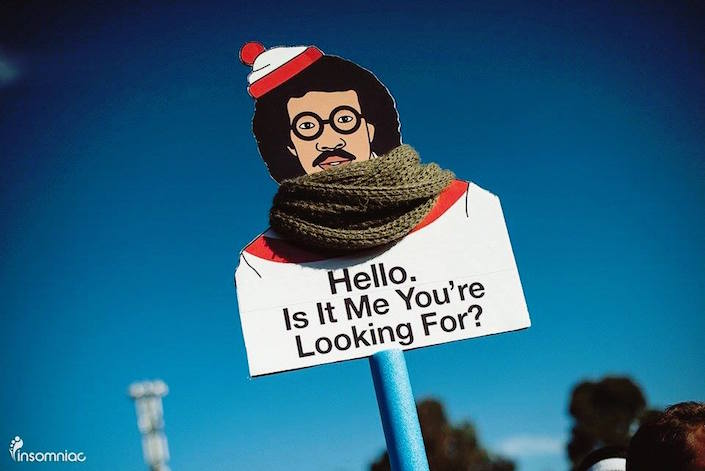
In an environment where there isn’t much opportunity to chat, talking about love comes down to basic primal communication: body language. Since love is thought to function as a set of evolutionary motivations, it follows that a large portion of interactions at festivals comes down to basic body expression.
According to NPR, “55 percent of attraction [at a crowded party] is a response to body language. (‘The way she moves…’) 38 percent is the tone and speed of their voice. And only 7 percent is through what they say.”
This makes sense—after all, it’s rare that I’m able to make heads or tails of what anyone is saying at a festival. It’s also consistent with the Coachella Missed Connections and many others in which attraction was born out of body movement.
“I wish I had said something to you, I keep seeing you dance back and forth in front of me.”
“Hey, Handsome! We stared at each other between the set of John Talabot and Jason Bentley in the Yuma tent on Sunday weekend two around 5:20 pm. Your stare pierced my dancing equilibrium.”
Is it love, or is it lust at work here? Funnily enough, it’s a bit of both. One of the main regions identified in the brain as a center for love is the caudate nucleus, a large region near the center of the brain that is part of our reptilian brain since it evolved before mammals, about 65 million years ago. This center not only lights up when looking at the photo of a loved one, but it is also responsible for directing body movement and plays a huge role in directing the brain’s reward system center—the areas of the brain that processes pleasure, arousal and the motivation to seek out rewards. Dr. Helen Fisher describes these findings at length in her piece “Biology: Your Brain on Love” in TIME:
These nerve cells distribute dopamine to many brain regions, including the caudate nucleus. And as this sprinkler system sends dopamine to various parts of the brain, it produces focused attention as well as fierce energy, concentrated motivation to attain a reward, and feelings of elation—even mania—the core feelings of romantic love.
If we can break love down into its chemical components, knowing the role that certain key hormones like adrenaline and dopamine play, how do certain social elements factor in to the equation?
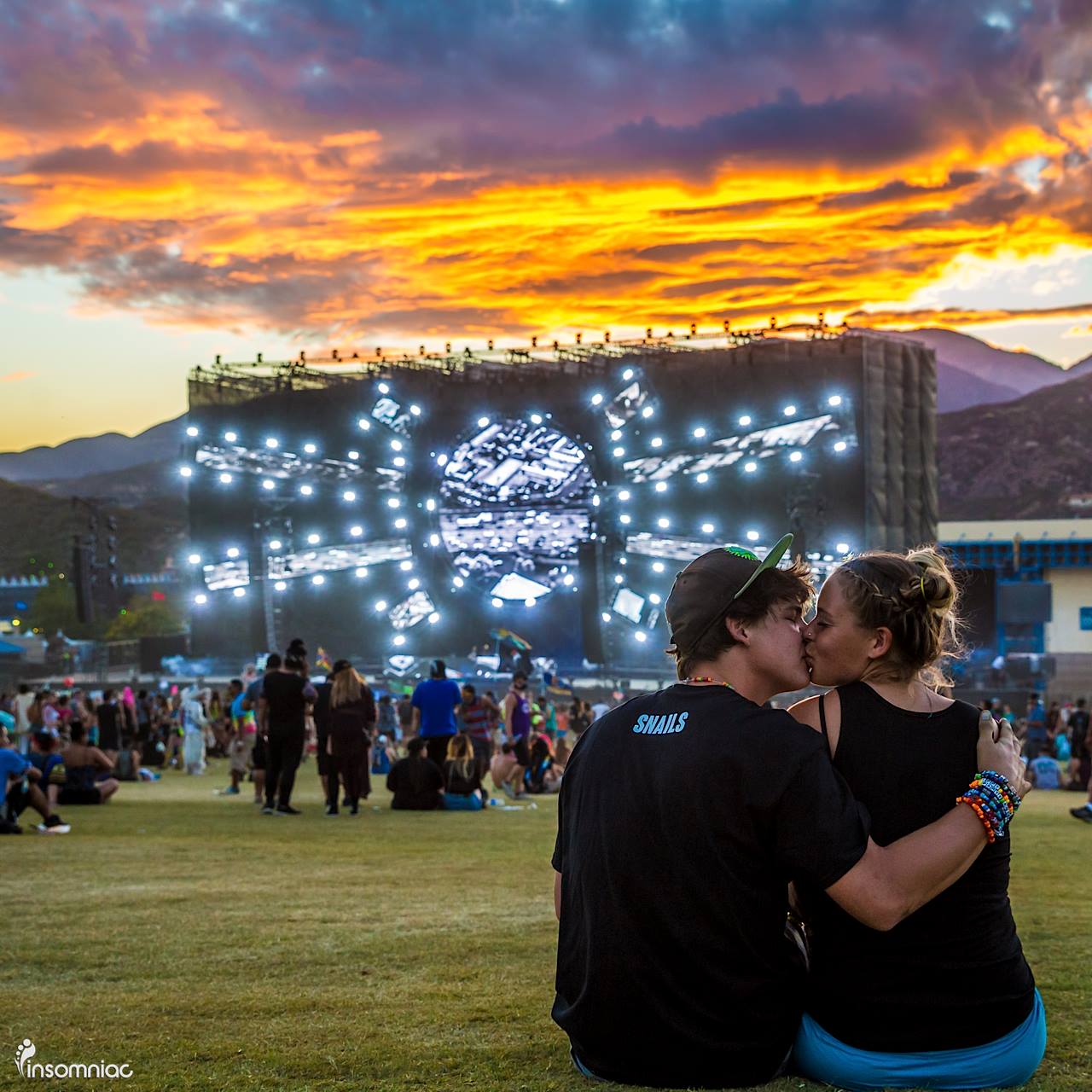
This is something I’ve been wondering for a long time. For many people, the appeal of music festivals like EDC is the ability to “escape from reality”—to be able to retreat to a world outside the confines of normal, day-to-day drudgery.
“For me, festivals are all about being away from reality, and if you leave your boring old self at home, then being unlike your usual self can be great for a weekend,” writes a user on Wikifestivals. “When you are back to reality, you may not be the same person that someone fell for at the festival.”
Part of maintaining the illusion of a place outside of reality is this social element where everyone is your friend; everyone is there to help, smiling, beaming, dancing. But is any of it real?
Some people argue that those feelings are very real—perhaps, somehow even more genuine than “normal,” everyday feelings. Another voice on the Wikifestivals page added, “I just find that a festival brings out who I am and allows me to be the ‘real’ me… I can just be me without judgment.”
Despite all this—despite all our speculation and information telling us that hormones are hormones, and emotions like love are merely the result of those hormones—you should absolutely fall in love at a festival. You should, because you deserve to be loved unconditionally; you deserve to be seen as you truly are.
Free of judgment, with your heart open wide, you need to know that in this cruel world, sometimes it’s okay to be vulnerable. Sometimes, vulnerability is the best thing. You shouldn’t always have to hide it and keep it secret, to keep your heart so hard, so safe. So long as you have love in your heart, the world will always reach out with open arms to greet you.
Know that you are safe—that you are worth loving, excessively, to bits and beyond reason. You deserve to know that if not every day, at least for just this one, you deserve to feel the magic—that tingly feeling you thought you forgot.
Forget the masks, the furries and the pasties. Just forget the costumes, and focus on the love happening all around you.

